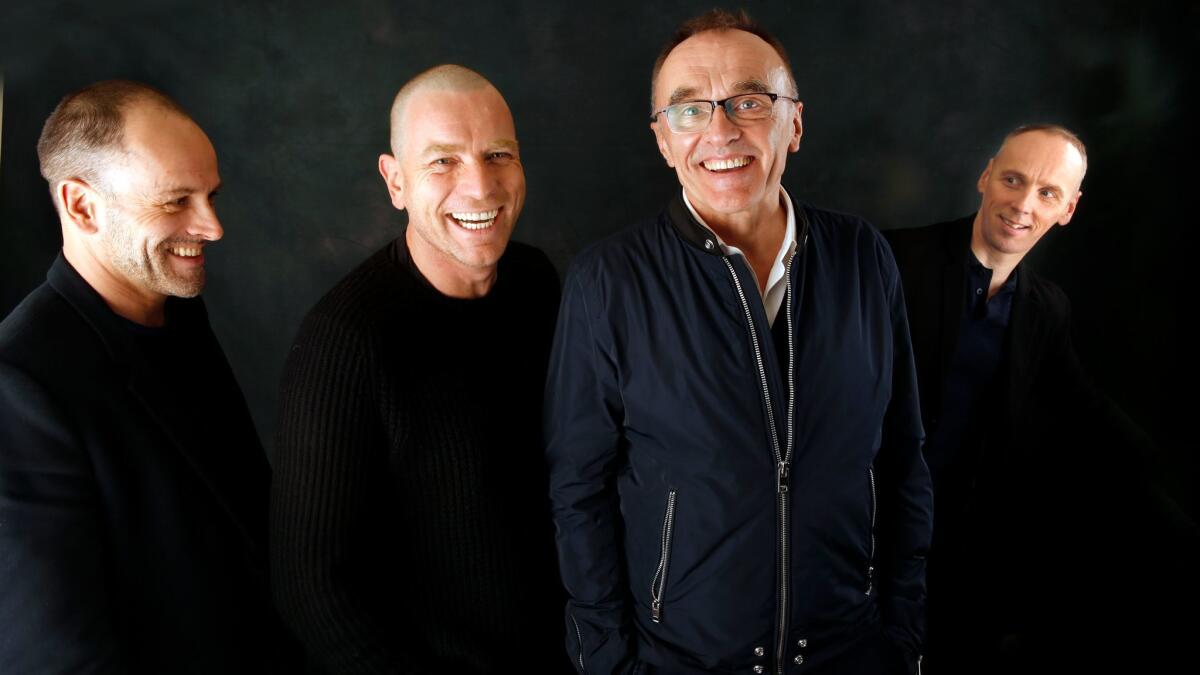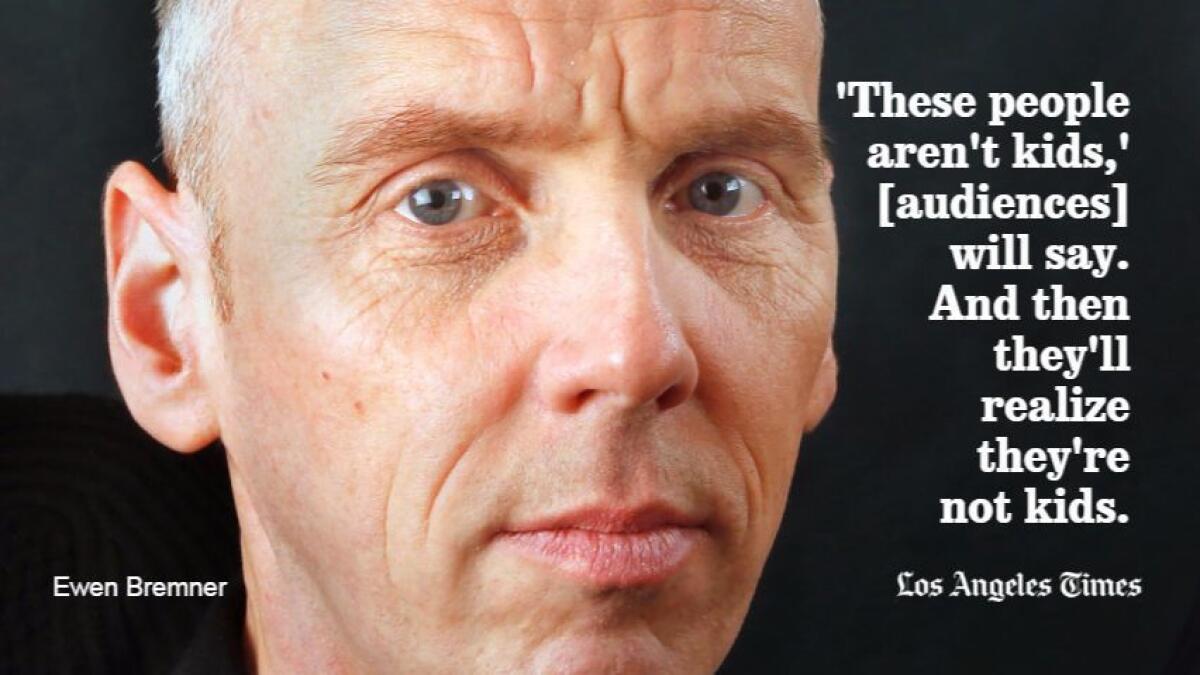Perspective: Twenty years later, Danny Boyle and the ‘Trainspotting’ gang stir up reunion feelings

- Share via
Reporting from New York — The past is a funny place. It’s the only spot all of us have been but can never return.
Unless you’re Danny Boyle and the cast of “Trainspotting.”
Then you can go back.
Well, at least just enough to realize how far away it is.
The sequel “T2 Trainspotting” arrives in theaters this weekend, and with it so does a glut of memories from Boyle’s original. The 1996 film about addicts in Edinburgh painted a contradictory picture, of desperation and glamour, comedy and sadness, all with the adrenalized edits and buzzy style Boyle would become known for.
As he and screenwriter John Hodge return to the characters, they stir nostalgic thoughts — not least because the movie includes the kind of references to and even scenes from the original that can be downright time-warping.
“It’s that telescope thing, isn’t it?” said the director. “You look at it through one end and it seems like another galaxy, then you turn it around and it’s right there in front of your face.”
The filmmaker was at lunch with three of his principal actors — Ewan McGregor as Mark Renton, Jonny Lee Miller as Simon/Sick Boy and Ewen Bremner as Spud — during a blizzardy day here earlier this week. The city-paralyzing March snow was a reminder, like the events of the movie, of how easily life’s plans can go askew.
Basked in a melancholic glow, “T2 Trainspotting” follows the gang as they converge after a life crisis prompts Renton to leave his life in Amsterdam and head back to Edinburgh. He subsequently must avoid the machinations of Robert Carlyle’s Begbie, hellbent on revenge for Renton’s betrayal two decades earlier.
But those are just plot points. Really “T2” is about memory, and masculinity, and middle age, not to mention the fact that getting back together — with people from your past, but also with the past itself — can be both a beautiful and awkward thing.
“It’s just nostalgia,” Simon laments to Renton as the latter tries to drag him back to a place of decades-old significance. “You’re a tourist in your own youth.”
Full disclosure, on the subject of youth: I was a college student when the original “Trainspotting” came out. It had the kind of effect on me that great cinema at that life moment can have. First I had — from the “Lust for Life” street-chase opening to the “colonized by wankers” monologue to the “Born Slippy” closing act of betrayal — the wonderstruck thought: “Wait, you can actually do that in movies?”
This was followed by a more personal reaction: I related to the characters. These guys weren’t just distant strangers, fun to watch and easy to forget about. They were me and my friends, even though I knew from heroin-grimy Scotland like Irvine Welsh knew from my Aunt Harriet.

I was hardly alone. “Trainspotting” was a Gen-X touchstone. And like all generational touchstones, it conjures memories not only of itself but of who we were when we experienced it. Nearly every film fan my age could probably give you some rich detail about the first time they saw “Trainspotting,” just as baby boomers could do for “The Graduate” and millennials for “Garden State.”
Equally full disclosure: A milestone school reunion is coming up. So this piece may contend more than most with questions of nostalgia and memory. But if a “Trainspotting” character catch-up 20 years later won’t put you in a reflective mood, what will?
“It’s not that I want to go back and do stuff again. Because I’m sure if you went back you wouldn’t be particularly happy,” Miller said about the memories his own reunion jarred loose. “But everything does come into focus about your past when you reach a certain age, in a way that allows you to have an affectionate appreciation of those experiences.”
A healthy attitude, Sick Boy. But easier said than done. More dispiriting reminders abound too.
“I was driving around on set with an actor and I had Oasis on,” McGregor said. “And the actor, she knew Oasis. But it hit me how different a relationship she had with it. I had to keep reminding myself she had that different relationship, that it meant something different to her [just] because of when she happened to be born.”
OK, so he’s wrong about the elemental ‘90s band. (It was Pearl Jam, Obi-Wan.) But fair enough on the larger point. It’s impossible to move through this world, especially this entertainment- and technology-saturated world, without constant reminders of when one came into it.

Ewan McGregor, Ewen Bremner, Jonny Lee Miller and Robert Carlyle return in Danny Boyle’s “T2 Trainspotting.”
More than most sequels, “T2” is preoccupied with time’s passage, and its disorienting nature. We’d all like to think the pathways from the past to the present are straight and marked. But more often we walk around confused about how we got here, let alone if this was where we’d always wanted to be.
“Don’t know how it all got started / I don’t know what they’re doin’ with their lives,” sang Bob Dylan about the unknown post-breakup trajectories of old flames, and it’s hard to watch a movie like “T2 Trainspotting” without similarly fatalistic questions about the characters on-screen.
Could Simon only but end up as a coke-fueled hustler? Spud as a sad heroin addict with a secret creative streak? Renton as a bougie expat in crisis? Seeing them in “T2” make the leap from there to here, I felt the way we tend to when running into school friends after so many years — “Well, now that I see what you’ve become, it makes sense. But I’m not sure I would have predicted it years ago.”
A life lived forwards but understood only backwards, as a thinker almost as wise as Dylan, Soren Kierkegaard, once remarked.
“I wasn’t from an arty family and wouldn’t have predicted back then I’d have done anything that was prestigious, that would sustain,” Boyle said. “And, some things didn’t sustain, like ‘A Life Less Ordinary’ or ‘Trance.’ There was just a lot of naivete at the time we made ‘Trainspotting.’”
And he was 40 when that movie came out.
But maybe that’s what’s most shocking about growing older and looking back — the realization that naivete and confusion don’t simply end at a certain point, that the feeling of being young can persist even as the presence of so many (actual) young people suggest otherwise.
“Maybe it’s Peter Pan complex, but I still feel like it’s all ahead of me. Like ‘one day, I’m going to do all of those things,’” said Miller, like his co-stars now in his 40s.
It’s what makes reunions — both school and movie — so sobering. The realization, really, that this adulthood we’ve allegedly attained is not about becoming new beings in the impossibly faraway place of our childhood imagination. Where was the land of grown-ups that once seemed so distant, so exotic, that would transform us so existentially? This is all still just us, with maybe a few more gray hairs and experiences to show for it.
Reunions are eerie, in the end, because they’re reminders that the line between youth and old age, between birth and death, is far less distinct than we’d like. (What, you thought a piece citing Dylan and Kierkegaard was going to be upbeat?)
Encountering artifacts from our childhood — whether photos of our teenage selves or images of actors we saw as teenagers — can have a paradoxical effect. Does a new scene of a young Renton and Spud highlight the distance to the past — or bridge it? Are reminders of Flatbush High School and the Whatsapp group that have been seeping into my day with re-enactments of teenage dynamics an uncomfortable reminder of time gone by? Or simply a chance to bring us closer to who we once were?
“Audiences will see this film and think about us as characters and actors,” noted Bremner. “‘These people aren’t kids,’ they’ll say. And then they’ll realize they’re not kids. For some that will be cathartic, and for others it will make them threatened; they’ll see the reality of age and want to step back from it. It all depends on how you want to look at it.”
See the most-read stories in Entertainment this hour »
Twitter: @ZeitchikLAT
ALSO
The director of this movie about rats has some novel ideas about Trump and filmmaking
In the age of alternative facts, decoding truth in documentary
Logic be damned: ‘T2 Trainspotting’ casts a profane, exuberant spell
More to Read
Only good movies
Get the Indie Focus newsletter, Mark Olsen's weekly guide to the world of cinema.
You may occasionally receive promotional content from the Los Angeles Times.











